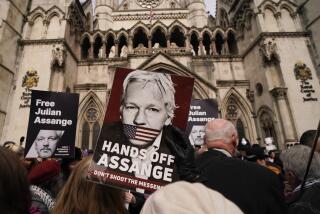Judge Blocks Extradition of Irish Fugitive
For eight years he was simply Jimmy Lynch, house painter. Not even his wife knew he was a fugitive Irish nationalist who broke out of Belfast’s notorious Maze Prison a decade ago in a daring mass escape.
With his arrest by the FBI last June, he is once again James Joseph Smyth, prisoner. But now, his battle against extradition to Northern Ireland is making him a hero in the Irish community and has touched off an international controversy.
For the record:
12:00 a.m. June 26, 1993 For the Record
Los Angeles Times Saturday June 26, 1993 Home Edition Part A Page 2 Column 1 National Desk 1 inches; 29 words Type of Material: Correction
Smyth case--A headline in Friday’s editions erroneously stated that a judge in San Francisco blocked the extradition of Irish fugitive James Joseph Smyth. The judge has yet to rule on extradition in the case.
In a victory for Smyth, U.S. District Judge Barbara A. Caulfield sanctioned the British government Thursday for refusing to turn over two confidential documents for her review. Smyth’s defense argues that the documents would prove British security forces have collaborated with loyalist death squads to eliminate political opponents.
In her ruling, Caulfield made two legal presumptions that the British government must now disprove: Catholic nationalists accused of crimes are subject to systematic retaliation or even death, and British security forces “participate in or tacitly endorse” such retribution.
The judge’s action greatly improves Smyth’s chances of beating extradition on the grounds that he would be subject to persecution if he is returned to Northern Ireland.
It also could help establish a legal precedent for political refugees from Northern Ireland--including two other Maze Prison escapees arrested in California.
The case has given Smyth an international forum to attack British rule and the administration of justice in Northern Ireland. He contends that he was falsely convicted of the attempted murder charge that sent him to prison in 1977.
Smyth’s fight against extradition has won support from a variety of political figures, including Reps. Ron Dellums (D-Berkeley) and Joseph P. Kennedy (D-Mass.). Eight members of Congress have signed a letter to Atty. Gen. Janet Reno criticizing Justice Department involvement in the case and asking her to ensure that the American judicial system is not held hostage to British interests.
But Assistant U.S. Atty. Mark Zanides, who is representing Britain in the case, argues that Smyth is little more than a common criminal who should be returned to Belfast to complete his 20-year sentence.
“The guy attempted to murder somebody and he escaped from prison, and now his return is being sought so he can serve the rest of his sentence,” Zanides said.
Smyth, 39, said he never belonged to the outlawed Irish Republican Army but was a member of Sinn Fein, the legal political party that supports the IRA’s armed activities. In an odd way, he said, he is relieved he can now stop running and begin speaking out on behalf of his people.
“I just want to stand my ground,” he said in an interview in jail. “I’m showing the people of America that the British government are not the nice people they claim to be.”
Smyth cites his own life story as an example of the kind of discrimination he alleges is pervasive in Northern Ireland--and that he says could lead to his death if he is extradited.
As a youth, he was arrested at least six times and at one point was interned for a year without charges, court records show. He was never convicted of a crime until he was accused of murdering a prison official in 1977.
In that case, authorities charged that Smyth was one of two men who went to the victim’s house and tried to shoot him. When the gun misfired, they ran away. A police officer who gave chase lost them in the crowd, but a mile away, Smyth, whose clothing matched that of one of the suspects, was arrested.
The prison official and his wife were unable to identify Smyth, and none of the fingerprints found at the scene matched his. But he was convicted by a judge in a non-jury trial on the strength of the arresting officer’s testimony.
In reviewing the case as part of the extradition proceedings, Judge Caulfield concluded that the evidence “raises serious questions about the validity of Mr. Smyth’s underlying conviction.”
In 1983, Smyth broke out of prison with 37 other inmates hidden in a truck. He spent the next nine months hiding out in farmhouses in the Republic of Ireland before obtaining a passport in the name of Thomas Lynch.
He came to San Francisco in 1984 and took up painting houses. He changed his name legally to James Lynch and, on the third anniversary of his escape, married an American woman whose name, by coincidence, was Lynch.
In the city’s close-knit Irish-American community, he occasionally ran into people who knew his real identity, including two other escapees from Maze, Kevin Artt and Paul Brennan. At one point, Smyth and Artt obtained new passports using the birth certificates of dead twins.
While living in constant fear that he would be discovered, he still felt secure enough in his new identity to travel to Ireland three times on his false passport to visit his family.
He said he was finally nabbed after someone in Belfast heard he was living in San Francisco and informed the authorities. Artt was arrested the same day in San Diego and Brennan was arrested in Berkeley in January when he applied for a passport under a false name.
Smyth is the first of the three prisoners to test a revised extradition treaty with Great Britain that was designed to prevent Irish terrorists from remaining in the United States on political grounds.
But under the treaty, a fugitive can win refuge here if he can prove he would be subject to persecution on racial or religious grounds if returned to Great Britain.
To prove that Smyth would face discrimination in Northern Ireland, his defense sought the two reports prepared by the British government that have never been made public. The British government, however, refused last week to release them to the judge.
More to Read
Start your day right
Sign up for Essential California for news, features and recommendations from the L.A. Times and beyond in your inbox six days a week.
You may occasionally receive promotional content from the Los Angeles Times.






